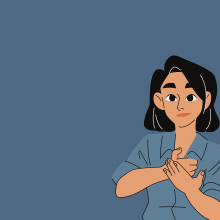From sounds to syntax: The science of language
Linguistics - the scientific study of language - is our topic for today. Chris Smith learns about the potential origins of human language with David Crystal, and how we assimilate vocal sounds into sentence structures with the University of Cambridge's Mirjana Bozic. Then, a fascinating finding about the way apes layer their communication is described by Adriano Lameira, before Cambridge's Regina Karousou Fokas gives Chris a lesson in Greek...
In this episode

00:45 - What is a language?
What is a language?
David Crystal
What is language? It’s probably a question that you don’t think about too often but it governs pretty much everything we do - including how we communicate, learn, comprehend, and even express our identity. This week, we’re going to explore the science of language - which is called linguistics - and, a bit later on, I'm even going to have a crack at learning Greek. But first, to explore the purpose of language, here’s David Crystal, honorary professor of linguistics at the University of Bangor…
David - Language is a system of communication, obviously. Everybody knows that. It exists in three big forms: in spoken form (speech), in written form and, also, don't forget, in signed form for people who are deaf and in other circumstances too. There are other types of language around the world, but these are the three main kinds. The thing about language is it has two sides. There's not just the three main types I've mentioned. You asked the question, what is it for? That's part of the definition of language and the answer is, it's there to enable us to understand each other; intelligibility, that's the big function of language. Less noticed is that it's there to express our identity, who we are, where we're from, what community we belong to and so on. And least of all mentioned in some of the definitions of language: it's there for us to play with, to be creative with. This is the side of literature and all the playful jokes and everyday riddles and things like that. Little children playing with language just because it's fun to do. There are these two big sides to language: the form and the function. Important to remember both.
Chris - I suppose there's also a scientific side to this, isn't there? Because although we use it, we're all familiar with communicating via language, there's also the opportunity to study how we ended up where we are today.
David - Yes, the science of language: linguistics. Now, what does that mean? It means, like any science, you study language as objectively as you can, comprehensively, systematically. All sciences do that. You describe the languages of the world (and there are an awful lot of them, over 6,000 languages in the world) and they've all got to be described, spoken, written and signed; a big task. Then, once you've carried out some of these descriptions, you try and work out what all these languages have in common: a theory of language, of human language. What is it that makes language possible in the human being? You do this in a scientific kind of way by setting up models of language and asking questions and testing them in experiments and things like that. If you think that science is all about machines and things, well there is that side of linguistics as well called phonetics: the science of speech, sound making and sound reception. If you go into a phonetics lab, you'd think you were in a scientific lab because there are machines all over the place, analysing the acoustics of speech and things like that. So, it's definitely a science, although we mustn't forget that it also has its artistic side as well.
Chris - When do we think it first manifest? How far back in time do we have to go to start to recognise, if we were an observer, two individuals speaking to each other.
David - The estimates vary enormously. Somewhere between fifty and a hundred thousand years ago. It all depends what you mean by language, you see. You say, spoken language, well that would require a vocal tract and all the organs of speech like our tongue and everything like that to be fully formed. That's a matter for evolutionary biologists to work out: when was that possible? But maybe it wasn't speech to begin with, maybe people were communicating very happily using signs and gestures and facial expressions and things like that. The other point to remember is that we may not know what the origins of language are, although there have been many theories about it, but we can also study the history of language scientifically, by which I mean you can go back through all the written records that have been made of the different languages of the world and that will take us back to something like five, six or seven thousand BC; early sign systems, Egyptian hieroglyphics, and all of that kind of thing. You can start studying the way language changes, how language evolves, if you like, over quite a considerable period of time.
Chris - Do we think that languages tend to evolve in parallel in the same way because of the way our brains work, because of the way our anatomy works? So we tend to converge on the same linguistic solutions to communicate things, and so, if you look at different disparate cultures around the world, you see the same evolution of language in those groups?
David - Well, the main evidence for that is the way in which children acquire language, and children from a wide range of languages have been studied now over the last 50 years or so. Indeed, it does seem to be the case that the evolution of language in the child is pretty well the same as you go from place to place. All children start using their first words at around about 12 months of age, and then they start putting two words together around about 18 months of age and so on and so forth. Aroundabout age three, they start stringing sentences together and, at the same time, they're developing their pronunciation along certain lines, they're developing vocabulary along certain lines. The parallels, as you go from culture to culture, are really quite striking. Which doesn't mean to say of course that there aren't differences and indeed there are. As we all know, the French have a word for it, the Welsh have a word for it. Every language has got certain concepts, certain words that don't easily translate into other languages. This suggests that there is also an evolutionary trend towards individuality, towards identity. My language is not your language and I show that by allowing it to develop in society and also therefore in my brain in a distinctive way. And so, yes, there are universals of language both in acquisition and, when you actually compare all the languages of the world, in terms of the way they're structured. But we mustn't forget that there's an awful lot of idiosyncrasy and individual differences between these various languages.
Chris - Based on everything you've told me so far, does this mean that language is something only humans can have or do we think that animals effectively have language as well?
David - If we include, by 'language,' body language - that is, facial expression and gesture - then it's perfectly plain that an awful lot of animals are able to communicate in a basic sort of way using their facial expressions and their gestures. Indeed, there have been experiments over the years to try and train certain types of animal to use human language. Some of the ape world, for example, the chimpanzees, where they've been taught signing and learnt a pretty significant vocabulary of communication, they are able to play with that vocabulary a little bit to enable a kind of conversation to take place. But it's all very limited and nothing at all, at the moment, as far as we know, resembles the ability of the human being to use language in an infinite kind of way. That is, to use sentences that nobody's ever heard before, and yet you understand them. To use vocabulary, to play with vocabulary. You're putting in new words, new constructions that nobody's ever used before and yet we understand them. That kind of creativity does seem to be innately present in human beings and no animal so far as we know has reached anything like that level of achievement.

08:58 - How the brain processes language
How the brain processes language
Mirjana Bozic, University of Cambridge
So, what do we know about what is happening in the human brain when someone is learning a language? I went to meet Mirjana Bozic from the University of Cambridge’s department of psychology. Mirjana is a cognitive neuroscientist who studies language…
Mirjana - In order for us to start understanding what's happening in the brain, we need to narrow it down to what type of information within the language signal we want to look into. This is something that linguists have defined for us. For instance, when we are speaking now, we are processing the sound of different words or individual elements within these words: phonology. When we are processing the meaning of individual words and the sentences, this is now known as semantics. If we are processing how different words are put together in sequences to know if something is a grammatical sequence in language or not, this is known as syntax or grammar. It's basically been shown that all of these different types of information, their processing can be differentiated in the brain.
Chris - When one thinks about the process of us communicating, it starts with me making a sound that goes to your ears. At what stage do your ears extract from the sounds that are coming in - because there are sounds in this room, there's us wriggling on the settee - and it extracts just the speech from that. How is that done?
Mirjana - This is done hierarchically, really. What has been shown is that the brain is going to be extracting, first, the very low level information from the signal. These would be frequencies, for instance. It's been shown that this is in early auditory processing areas of the brain. These are known as primary auditory cortices and these are parts of the brain that are in the temporal lobe. That's part of the brain that's close to your temples and close to your ears on both sides of the brain. Then, it goes progressively from there to extract more linguistic information, more language specific information, in areas that are a little bit further apart from the primary auditory cortices. So, there is this hierarchical processing of different levels of information from low level perceptual information to meaning of individual words.
Chris - So it pulls out what is speech first. Say there's five other people in this room and they're all having a conversation. How do I focus just on information from you if you're the person I'm talking to?
Mirjana - Well language obviously is working together, so to speak, with other cognitive processes in order to make it flow and so we can use languages as efficiently and effortlessly as we do. So in order to do that we would be using something called selective attention. This is the ability to focus on the properties of the signal that are relevant and to ignore the signal that's irrelevant and that is going to be more or less difficult depending on what you're focusing on and what the interference is. It's easy enough to differentiate between speech that you want to focus on and music, for instance, because they differ on all sorts of low level features. Whereas, if somebody is speaking in a different language, for instance, that's going to be slightly more difficult. If somebody is speaking in the same language that we are having a conversation in, that's going to be more difficult. So there are these sort of hierarchically different levels of processing that are more or less difficult to suppress depending on their features, their properties.
Chris - When I'm listening to you talking to me, I think my brain is anticipating what you are probably going to say next, and when that is the case, it's happy, when that's not the case, it's sort of peaking my attention. Is that how I'm staying trained on and paying attention to what you are saying? Is that how I'm decoding it on the fly?
Mirjana - We are certainly predicting quite a lot of what's likely to happen next. That's based on your general knowledge of language, the knowledge of the conversation that's happening. There is always this interaction between the top down processing and the bottom up processing, meaning that there is going to be information that's extracted from the signal itself - so low level properties of the signal - and then the top down knowledge of what's likely to happen given the language that we are speaking in. There is going to be integration between those two. Ultimately, that's going to give us this effortless way that we use language as easily as we do.
Chris - And what about if I come along and learn another language? How does my brain cope with that? Because I can speak French, so how does my brain know I'm in English mode, and I understand that and I think in that and I put the words together in the right order. But when I want to, I can flick a switch mentally and then I'm in French mode.
Mirjana - That is a question that has been a focus of a lot of attention scientifically in the last, I would say, two, three decades. What has been shown pretty consistently is that having two languages, this bilingual context, leads to competition between them. They're co-activated constantly regardless of whether one of those languages is irrelevant for the particular communicative context. So, for instance, we are using English now and our other languages are not really relevant for this particular context, but they're going to be at some level competing with the signal that we actually intend to use. That's likely to lead to some processes of selection and competition between the two. This has been one of the very interesting things in bilingualism literature that show that there is this consistent suppression of the irrelevant signal that's taking place in order to use the relevant signal.

15:01 - The layered language of great apes
The layered language of great apes
Adriano Lameira, University of Warwick
But first, we’re going to talk about Russian Dolls. It’s a term that linguists use to describe one phrase fitting inside another - which is a characteristic feature of how humans speak. For instance, I might say, “when I left home this morning, because it was sunny, I didn’t take my umbrella.” We thought that was uniquely human. But now comprehensive analysis of vocalisations recorded from orangutans has revealed to Warwick University’s Adriano Lameira a similar pattern of “speaking”. So, is this pointing towards the evolutionary origins of how we humans learned to talk?
Adriano - I study great apes both in the wild and in captivity, to really try to understand and decipher their vocal communication. Because a lot of times we know that our species is unique in terms of our language capacity. And oftentimes we quickly assume that we are categorically different from our closest living ancestors, the great apes, when in fact we draw these conclusions without actually putting in the necessary effort to prove that those capacities are indeed absent in our closest living relatives. And so I kind of use and study great ape communication, cognition, cultures as a time machine to go back to our own ancestors and try to understand what they were capable of and why did that steer our lineage towards what was to become one day fully fledged language.
Chris - Because people often say that some dramatic jump or mutation or shift happened that endowed humans with a range of things, including language. Whereas if what you are saying is true, then it's a more gentle slide in evolutionary terms where various building blocks are assembled and then slowly come together in us to give us those abilities. So they should therefore be vestiges of those building blocks out there in the natural world. We just need to find them?
Adriano - Correct. Exactly. So actually the principles of evolution by natural selection tells us that we should expect those gradations, we should expect a continuum within phylogenetic families.
Chris - How did you put this to the test?
Adriano - So actually the behaviour came to us. We were following wild orangutans daily and recording every vocal behavior that they did because we want to catalog their repertoire before they go extinct. And when we started to try to really quantify the characteristics of these loud calls produced by males, we started to see hints of different layers of signals.
Chris - When you say layers, tell us a bit more about what you mean by that and why that's special.
Adriano - Right. So as layers, I mean different levels of organisation. So this characteristic of putting a signal or a pattern within itself or within a similar signal or pattern. An example would be Russian dolls where you have one doll that fits within itself. This is important because this is how we tend to organise our own stream of words and sentences. I can be saying a phrase and then insert another phrase in there to further explain my point, and then I step out again of that little clause and I continue my original sentence. So this is something that languages do all the time. It's claimed to be universal and therefore claimed to be one of those things that really makes human language distinct from every other animal vocal system is that only we can insert a sequence of sounds within another sequence of sounds. And so when we started to see hints of layers in wild orangutan loud calls, we thought maybe this is the type of evidence that has been missing.
Chris - You've sent me some examples of what you recorded. Can you talk us through what we're going to hear here, and signpost us towards each of the examples? So which one would you like to start with and just tell us what we're gonna hear before we play it.
Adriano - So I brought two recordings along. The first one are the pulsar, which are kind of the climax of the wild orangutan loud call. These are the kind of extended notes to be heard and broadcasted across large distances of the forest. So these we can think of as the larger Russian doll. Exactly. So these, these are the extended notes that carry over the course so that other orangutans, both females and males hear the calling male.
Chris - And those punctuated loud noises, those are the big outer Russian doll. So those are the sounds that you are saying if I was speaking to you and I wanted to include a phrase inside something I'm already saying, those would be the outer capsule as it were. And now we're going to think about what's going in the middle?
Adriano - Correct. We are gonna hear grumbles, which we can think of as the smaller layer of our sound Russian doll. So we can still see here the pace of the larger notes. Right? We can hear <sounds imitation> so we still have the tempo of the larger pulses, which kind of the carrier bray, so to speak, the larger doll. And now we have smaller nodes, staccato notes with their own little tempo inside the main beat <sound imitation> regular, notes inside regular notes, which kind of effectively is an example of a pattern nested within itself.
Chris - You are arguing that because they can do this, that is the foundation for what we do when we are actually nesting phrases and doing recursive speech patterns.
Adriano - Exactly. So one of our most important tasks here was to try to disentangle are these not just the result of a bodily resonance, for example. And so what we found is when characterising the two tempos and seeing their relationship, their ratio, the quicker, smaller tempo was not related to the larger one. And so what this led us to conclude and be able to exclude the possibility that the smaller tempo is indeed not an artifact of the larger one or vice versa,
Chris - Given that orangs are more distantly related to us than say chimps and bonobos are, if they've got this and this is part of the origin of us being endowed with a similar ability, does this mean it should be in other great apes? And is it therefore a question of going, looking for this now in bonobo and chimpanzee vocalisations, for example, which would give confidence to what you are saying is, is right?
Adriano - Absolutely. That's an excellent question. And yes, that would be the assumption. If orangutans being the earliest diverging lineage of great apes, one would assume that closer related lineages to us, such as chimps and vulnerables and gorillas, they would also have. However, I think right now the understanding is that all the great apes really need to be treated as a family because different lineages have gone to do different adaptations. So for example, we know that our last common ancestor with great apes was not as terrestrial as chimpanzees and bonobos and gorillas. And so in terms of lifestyle, actually orangutans, although genetically relatively further, they still live a lifestyle and an environment that is actually closer to what our ancestor lived with. And so I, I think in this sense, we should definitely go and search in the African apes. The clues may be there and they may have been hidden in plain sight just like they have in the case for the orangutan long calls.

23:44 - It's all Greek to me! Learning a new language
It's all Greek to me! Learning a new language
Regina Karousou Fokas
Chris Smith has a crack at learning Greek. He was supposed to meet his teacher - Regina Karousou Fokas at the University of Cambridge - in-person, but there was a very good reason that he couldn’t…
Regina - Because I don't want you to have what I have! A long forgotten friend but ever present: Covid.
Chris - And that's a Latin name, isn't it? Of course, 'coronavirus.' Corona: crown, virus: poison in Latin. That's come to visit you today so we're trying to do this lesson on Zoom. Do you normally teach over Zoom?
Regina - Well it was a very steep learning curve during the years of Covid because from one day to the next we had to transfer all our teaching online. Initially, I thought that would be impossible, but actually it is not impossible. So yes, I still teach from time to time on Zoom or online. And of course many meetings are carried out online, so it's something that is part of our lives, now.
Chris - This is going to be a really good test for me because I have never tried to learn modern Greek. My encounter with the Greek alphabet was at school trying to do ancient Greek, and I really struggled. I have to admit that I saw all the letters, but I kept trying to turn the Greek sounds into English letters, if you see what I mean. The Alpha's obvious because 'A' for 'alpha', 'B' for 'beta,' but some of the letters like 'hora,' you'd say that, but it looks like a letter 'X' and I kept wanting to say 'X' instead of 'hora'. Is that something that some people just naturally can get? Because I can't do it.
Regina - I'm sure you can if you give it a little bit of a try and concentrate on the sound to letter correspondence for a little more than five minutes. The alphabet is different from the Latin alphabet. But then again, it's not completely different. There are letters, as you say, that are the same. This is, again, not by coincidence because the Greek alphabet gave rise to many alphabets in Europe. Latin is one of them. There are 24 letters in the Greek alphabet. Some of them are completely different, but others are similar. They are pronounced similarly, like, 'Ah' or like 'Oh' as you mentioned, or like the letter 'v' that is the sound corresponding to 'N' in English. So these are close friends, but there are also what we call false friends: letters that look alike in the Greek alphabet and the English alphabet but then the pronunciation is completely different.
Chris - I'm in your hands Regina. So get me actually saying something that sounds half decent and then point out the pitfalls as to how I should try and attack speaking and getting to grips with a language I've never tried to get to grips with.
Regina - Learning to read Greek is actually not difficult because the alphabet is what we call transparent. So, a letter corresponds to a sound and that sound is stable wherever that letter is found in the word. It's not like English or French where there are letters or strings of letters that you actually don't end up pronouncing when you read the word.
Chris - You mean like 'row' and 'row' where they're spelled exactly the same way, but they completely confuse the hell out of foreigners because, unless you know the context and know the language, you say them wrong.
Regina - Exactly.
Chris - Like Leicester Square in London completely kills many tourists, doesn't it?
Regina - Exactly. Or Peterborough or things like that. In Greek, what you see is what you get. Greek words tend to be long, especially if you compare them with other European languages. That has its explanation as to why they are longer, but it's not uncommon to have words that could be eight syllables long. Knowing where to stress the word is very helpful, particularly for the purposes of someone learning the language. So there is the word 'kamilopardaliamil' that I always write on the board for my students when we start reading and writing and you have to persevere reading every single syllable. You can't get away with rushing your way through the word. Every syllable, every letter has to be sounded out and you have to know as well where to put your stress and be absolutely correct.
Chris - Does that affect the ability of a person, a listener, to pick up on the meaning? Because if you are forced to speak and enunciate properly to get those stresses right, does that stop people doing what I have a tendency to do, especially if I've had too much coffee, to go really fast, swallow bits of words and make it hard for people who don't naturally and natively speak English sometimes to understand?
Regina - It does happen. Learners of Greek do complain that we speak very fast. It's natural. We all do that in our native language. From the listener's point of view, encoding natural speech could be a problem. On the other hand, if you do know that you can't miss anything out, then your brain starts working in other ways as well. This is one of the best things about learning another language: you train your brain to be more agile and actually be flexible and accept differences that can be extended to other parts of your life as well.
Chris - You need to teach me some Greek. So I was thinking, why don't we start with 'The Naked Scientist?' Because I can tell you in French it's 'le scientifique nu,' which doesn't have quite the same ring to it. But what would it be in Greek?
Regina - So in the singular, that would be 'o gymnós epistímonas'
Chris - 'Yim-noss epi-stim-in-os'
Chris - Is there any masculine and feminine in Greek?
Regina - I was going to go there. If a female scientist is who we are talking about, then that would be 'gymní epistímonas' So there will be a difference at the ending of the adjective. In that particular noun, however, of 'scientist' the gender is neutral. So it's for both male and female people.
Chris - The 'the' and the 'A,' is that intrinsic to the noun? Because, because we would say 'The Naked Scientist' and have a word for 'the', but is that intrinsic in Greek?
Regina - You do.
Chris - So what would be the word? What would I say?
Regina - There is a difference in the gender. 'o gymnós epistímonas' for a man and 'i gymní epistímona' for a lady. There are three genders in Greek; masculine, feminine, and neuter. The article, as you mentioned, that was a grave omission from my part when you first asked me the question. The article has to be present there.
Chris - Why is that the convention?
Regina - The definite article is part and parcel of the word that can't be omitted.
Chris - Well, I'm pleased to say it's no longer all Greek to me. Thank you very much, Regina.
Regina - Good. I expect you in my classes next year, then.
Chris - Do you think I've got potential?
Regina - Oh yes.










Comments
Add a comment